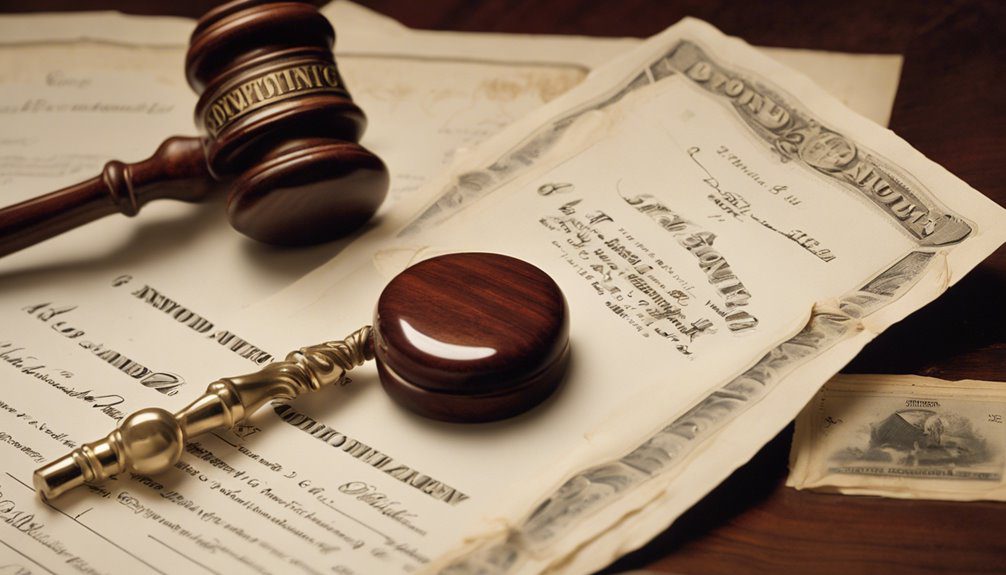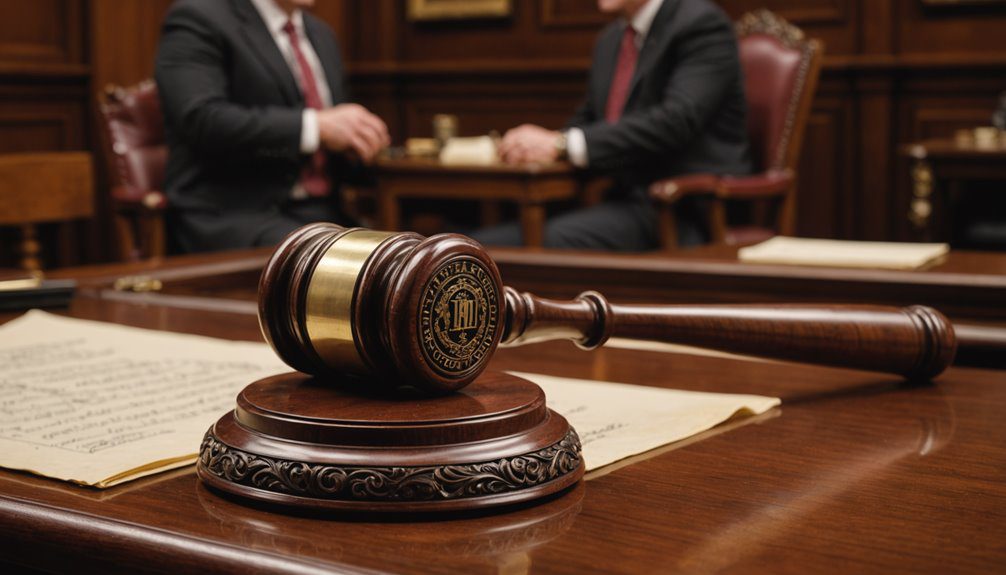If you're considering a career as an apprentice auctioneer in Pennsylvania, understanding the Pennsylvania Apprentice Auctioneer Bond is essential. This bond not only ensures you comply with local auction laws but also protects your clients from potential losses. By securing this bond, you're signaling your commitment to ethical practices, which can significantly enhance your professional reputation. However, the process of obtaining this bond and the implications of non-compliance can be complex. What steps do you need to take to ensure you're on the right path?
What Is an Auctioneer Bond?

Understanding what an auctioneer bond is crucial for anyone entering the auction business. An auctioneer bond functions as a financial guarantee, ensuring that you'll adhere to local laws and regulations while conducting auctions.
This bond protects both buyers and sellers, providing a safety net in case you fail to fulfill your obligations.
When you become an apprentice auctioneer in Pennsylvania, obtaining this bond is often a requirement. It shows your commitment to ethical practices and helps build trust with your clients.
Essentially, the bond acts as a form of insurance, safeguarding against potential losses resulting from dishonest actions or negligence on your part.
In the event of a claim, the surety company that issued your bond will investigate the situation. If they find the claim valid, they'll compensate the affected party up to the bond amount, but you'll be responsible for repaying this amount.
Therefore, understanding the nuances of an auctioneer bond is critical for protecting your reputation and finances. By grasping its purpose and requirements, you can navigate your way into a successful auction career with confidence. Additionally, auctioneer bonds serve as a regulatory requirement for auctioneer licensing in many states, ensuring compensation for individuals harmed by auctioneer misconduct.
Importance of the Bond
The importance of the Pennsylvania apprentice auctioneer bond can't be overstated. This bond serves as a crucial safety net for clients and the public, ensuring that you adhere to ethical practices and comply with state regulations. When you obtain this bond, you're not just fulfilling a legal requirement; you're also building trust with your clients. They can feel secure knowing that there's a financial guarantee backing your services.
Additionally, having this bond is essential for your professional reputation. It shows that you take your role seriously and are committed to conducting business honestly. If any issues arise—like failure to pay fees or misrepresentation—clients can file a claim against the bond. This not only protects them but also holds you accountable for your actions.
Moreover, being bonded can give you a competitive edge in the auction industry. Many clients prefer working with bonded auctioneers, as it reflects professionalism and reliability. In an industry where reputation matters greatly, having your Pennsylvania apprentice auctioneer bond can make a significant difference in attracting clients and building a successful career. Furthermore, the bond helps ensure compliance with state regulations that govern auctioneering practices.
Eligibility Requirements

To become a licensed apprentice auctioneer in Pennsylvania, you must meet specific eligibility requirements that ensure you're prepared for the responsibilities of the role.
First, you need to be at least 18 years old and a resident of Pennsylvania. This age requirement helps guarantee that you have the maturity and legal standing necessary to engage in auction activities.
Next, you must complete an approved auctioneer education program. This training covers essential topics, including auction laws and ethics, marketing strategies, and gavel techniques. After finishing the program, you'll need to pass a written exam to demonstrate your understanding of the material.
Additionally, you must find a licensed auctioneer to act as your mentor. This experienced professional will guide you through your apprenticeship and help you gain practical experience in the auction business.
It's crucial to establish a good working relationship with your mentor, as they'll provide valuable insights into the industry.
Lastly, you'll need to submit a completed application along with any required documentation. By meeting these eligibility requirements, you'll be well on your way to becoming a successful apprentice auctioneer in Pennsylvania.
Bond Application Process
When applying for your apprentice auctioneer bond in Pennsylvania, you'll need to gather several key documents and complete specific forms.
Start by obtaining a completed bond application form, which you can typically find on the bonding agency's website or by contacting them directly.
Next, you'll need to provide proof of your apprenticeship under a licensed auctioneer. This may include a letter from your supervisor or a copy of your apprenticeship agreement.
Make sure you also have a valid ID, such as a driver's license or state-issued ID, to verify your identity.
In addition to these documents, prepare any required financial information. Some bonding companies may ask for details about your credit history or other financial credentials.
It's crucial to have this information readily available to expedite the process.
Once you've gathered everything, submit your application along with the necessary documents to your chosen bonding agency.
After your application is reviewed, you may need to answer additional questions or provide further information.
Once approved, you'll receive your bond, allowing you to proceed with your apprentice auctioneer activities legally. Additionally, ensure that you comply with local ordinances to avoid any potential issues with your bond approval.
Costs and Fees

Understanding the costs and fees associated with obtaining your apprentice auctioneer bond in Pennsylvania is essential for budgeting your expenses. The bond premium is typically a percentage of the total bond amount, which can range from $10,000 to $20,000. Depending on your credit score and the bonding company, you might pay anywhere from 1% to 10% of the bond amount annually.
You should also consider additional fees that may arise during the application process. These can include processing fees, which some companies charge for paperwork handling, and potential underwriting fees based on your financial background. It's crucial to read the fine print and understand all associated costs.
Furthermore, don't forget about renewal fees. Your bond will need to be renewed periodically, and these costs can vary, so it's wise to factor them into your long-term budget. Additionally, having a good understanding of local regulations can help ensure compliance and streamline the bonding process.
Comparing quotes from various bonding companies can also help you find the best deal. By understanding these costs upfront, you can ensure you're financially prepared to secure your apprentice auctioneer bond without any surprises.
Duration of the Bond
Many people might wonder how long their apprentice auctioneer bond in Pennsylvania lasts. Typically, the bond is effective for a period of two years, aligning with the state's licensing requirements. This means you'll need to ensure that your bond remains active during this entire timeframe if you wish to practice as an apprentice auctioneer.
It's crucial to remember that your bond doesn't automatically renew. Before the two-year period ends, you'll need to take steps to renew your bond to continue your apprenticeship without any interruptions. Failing to maintain an active bond could impact your ability to operate legally in the auctioneer profession.
Additionally, if there are changes in your situation, such as a change in your apprenticeship status or any other relevant circumstances, you should consult with your surety provider. They can guide you on how these changes might affect your bond's duration.
Responsibilities of an Apprentice

As an apprentice auctioneer, you have several essential responsibilities that ensure your success and compliance within the profession. First, you need to learn the auction process, including how to conduct auctions, bid calling, and understanding auction terminology. This foundational knowledge is crucial for your growth and effectiveness in the field.
Next, you should shadow your mentor, absorbing their techniques and strategies. This hands-on experience allows you to gain insights into managing bids, engaging with bidders, and maintaining a lively atmosphere during auctions. Don't hesitate to ask questions; your mentor's experience is invaluable.
You're also responsible for familiarizing yourself with local regulations and laws governing auctions. Understanding these rules helps you avoid potential pitfalls and ensures your operations remain compliant.
Additionally, you should assist in marketing efforts, from promoting upcoming auctions to managing social media accounts. Building your network is vital, so attend industry events and connect with other auctioneers and potential clients.
Consequences of Non-Compliance
Non-compliance with auction regulations can lead to serious repercussions for apprentice auctioneers. When you fail to adhere to the rules set forth by the Pennsylvania auctioneer licensing board, you risk facing penalties that could jeopardize your career.
Potential consequences include hefty fines, which can drain your finances and disrupt your training. In some cases, non-compliance might result in suspension or revocation of your apprentice auctioneer license. Losing your license means you can't participate in auctions, putting your professional aspirations on hold.
Moreover, repeated violations may lead to a permanent ban from the auctioneer profession, affecting your reputation in the industry. Additionally, you could face legal action from clients or competitors if you engage in unlawful auction practices. This can lead to costly lawsuits and further damage your credibility.
Ultimately, non-compliance not only affects your immediate goals but also casts a shadow over your professional future. To avoid these risks, it's crucial to stay informed about auction regulations and maintain a commitment to ethical practices in your work.
Tips for Success in Auctioneering

Success in auctioneering hinges on a blend of preparation, communication, and ethical practice. First, familiarize yourself with the items you'll be auctioning. Research their market value, condition, and unique features. This knowledge not only boosts your confidence but also helps you provide accurate descriptions to potential buyers.
Next, hone your communication skills. Practice your auctioneer chant to improve your rhythm and speed. Clear articulation is key, as it keeps bidders engaged and informed. Additionally, build rapport with your audience; make eye contact and use positive body language to create a welcoming atmosphere.
Ethical practices are crucial in maintaining your reputation. Be transparent about any fees and ensure all items are accurately represented. Misleading bidders can lead to legal repercussions and damage your credibility.
Resources for Aspiring Auctioneers
For aspiring auctioneers, tapping into the right resources can make a significant difference in your journey. Start by exploring local auctioneer associations. These organizations often provide invaluable support, networking opportunities, and access to training programs. Joining one can help you connect with experienced professionals who are eager to share their knowledge.
Consider enrolling in auctioneer schools or online courses that offer training in bid calling, auction ethics, and market analysis. These programs can equip you with the skills necessary to excel in the field.
Don't forget to check state regulations, as they may require specific licensing or apprenticeship programs before you can operate independently.
Utilize online forums and social media groups dedicated to auctioneering. Engaging with fellow aspiring auctioneers and seasoned professionals can offer insights into industry trends and best practices. Additionally, read books and industry publications to stay informed about the latest developments and techniques.
Lastly, attend auctions whenever possible. Observing live events will help you understand the dynamics of the auction process and refine your skills.
With the right resources, you'll be well on your way to becoming a successful auctioneer.
Conclusion
In summary, obtaining a Pennsylvania Apprentice Auctioneer Bond is essential for your success in the auction industry. It not only protects your clients but also enhances your credibility and reputation. By understanding the bond's importance, fulfilling eligibility requirements, and following the application process, you can pave the way for a thriving career. Stay informed about your responsibilities and prioritize compliance to avoid any consequences. With commitment and the right resources, you're well on your way to becoming a successful auctioneer.


